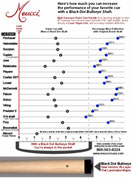|
Additional Information: |
Meucci Cue Sticks Frequently Asked QuestionsWhat makes one cue cost
so much more than another=? What is Meucci's
warranty policy? If the cue is broken in half, it has obviously been struck from the side, either by being thrown down; slammed against the table when breaking the balls or held behind the neck while stretching which causes undue side pressure. In some rare cases, a cue is even broken over someone's head in a fight. In any case, we obviously do not warranty against breakage, simply because the cue has undergone sufficient side pressure in the process of manufacturing to show any weakness that might be inherent in the cue such as a crack. There have been some cases where we have replaced broken butts, but, we generally will repair a broken butt at a minimal wholesale cost to the end user. Concerning warpage, the shaft of the cue is open to the atmosphere so it is therefore, not warranted against warpage. Obviously we cannot control how you care for or store your cue. If the butt is warped and shows no signs of moisture abuse, we will replace it free within 90 days of purchase. We will require a copy of the sales receipt. What material
is the Meucci ferrule made of? The new Meucci ferrules are 100% guaranteed and we will replace (at no charge) any that crack or split as a result of play. Other manufacturers are now claiming "new and better," while incorporating our technology, but, Meucci Originals has always demanded a soft, flexible ferrule because we know that play is more important than longevity when considering a ferrule material. Generally a shaft needs replacement after 3 to 5 years because it's dimension is so worn down from light sanding, polishing, and tip replacements. What is important to us and surely you the player (at least our pro's tell us so) is that, during that 3 to 5 years, you play the best pool of your life rather than sport a shiny, hard (heavily deflecting) ferrule that still looks great on the shaft that you just threw in the trash because it no longer plays the same. What kind of tip
does Meucci use? What type of wrap
is on a Meucci cue? Particularly when you consider that we are the only cue maker that offers basic solid black and natural wraps which look much better with most butt designs that the speckled wraps (black / white spec, green / white spec, etc..) We decided to make this change more than 25 years ago because once cue makers started pressing wraps to get them smooth and flat, the Irish Linen wrap was no more functional as a sweat absorbing wrap, but was merely a traditional part of the design of the butt. Therefore, let's keep it clean and attractive. Just picture one of our cream wraps mixed with blue chalk - "ain't it purrrty!" Of course, because we are a custom cue maker, we do offer the standard pressed wrap with no finish as an option. What are the measurements of a Meucci? What type of wood is in a Meucci? What is the best cue weight for me? What type of coating does Meucci use on their cues? Can my cue weight be changed? What options are available? How can I get my cue repaired? Do you use ivory in your cues? What is your metal butt joint made of? What is a wood to wood joint? How should I care for my cue?
|
NEW FACTORY ADDRESS
Meucci
Cues
3709 Hwy 302
Byhalia, MS 38611
Sales - (662)895-3220
Repair/Warranty - (662)895-3220
Fax - (662)895-3239
| Sales and Product Info: sales@meuccicues.com |
Repair / Warranty Info or Checkon: |
